Study Skills for Higher Education: CSR Literature Review and Report
VerifiedAdded on 2020/10/23
|8
|2406
|234
Report
AI Summary
This report provides a literature review on Corporate Social Responsibility (CSR), examining its importance for companies and society. The report begins with an introduction to literature reviews, defining their purpose and objectives in academic research. It then delves into the concept of CSR, exploring its definition, impact, and various activities undertaken by organizations. The report highlights the interwoven relationship between businesses and societies, emphasizing the expectations of societal welfare and improved living standards. It discusses different types of CSR initiatives, including environmental sustainability, philanthropic activities, ethical business practices, and economic responsibility. The conclusion summarizes the key findings, emphasizing the role of CSR in building a positive business image, gaining a competitive advantage, and fostering sustainable development. References to books and journals are provided to support the analysis.
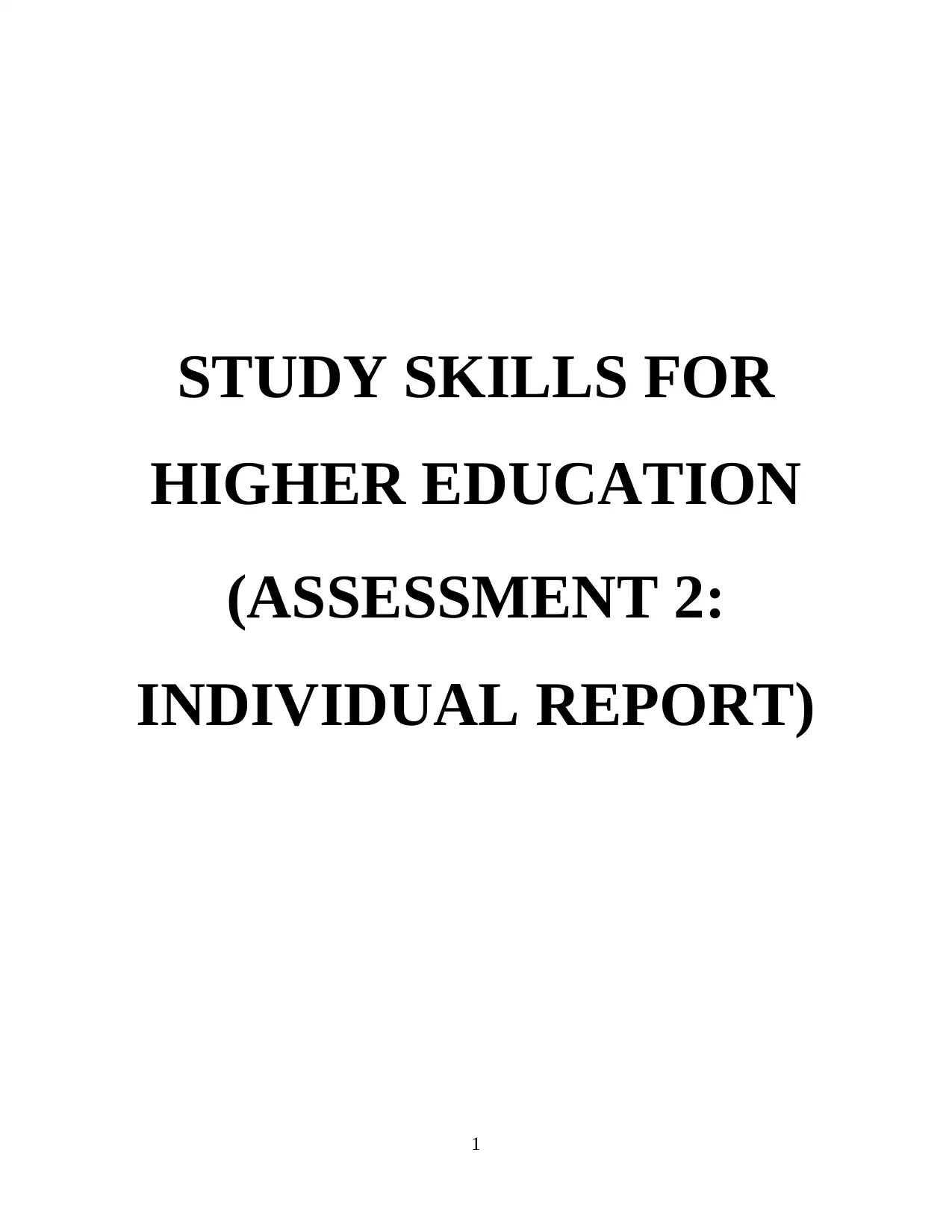
STUDY SKILLS FOR
HIGHER EDUCATION
(ASSESSMENT 2:
INDIVIDUAL REPORT)
1
HIGHER EDUCATION
(ASSESSMENT 2:
INDIVIDUAL REPORT)
1
Paraphrase This Document
Need a fresh take? Get an instant paraphrase of this document with our AI Paraphraser

INTRODUCTION...........................................................................................................................................3
What is literature review and what does it achieve?...............................................................................3
Literature Review on the topic “Corporate Social Responsibility”...........................................................4
CONCLUSION...............................................................................................................................................7
REFERENCES................................................................................................................................................8
2
What is literature review and what does it achieve?...............................................................................3
Literature Review on the topic “Corporate Social Responsibility”...........................................................4
CONCLUSION...............................................................................................................................................7
REFERENCES................................................................................................................................................8
2
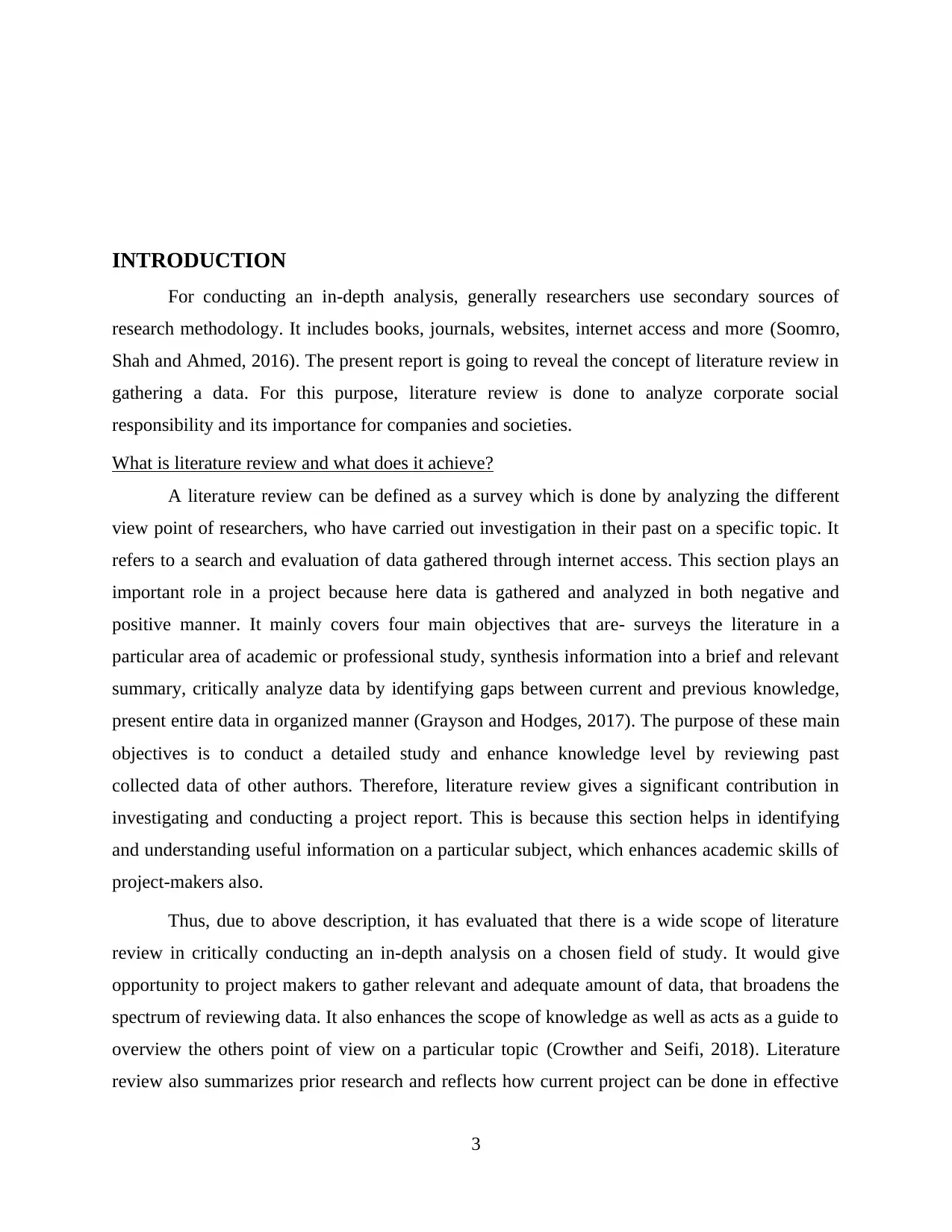
INTRODUCTION
For conducting an in-depth analysis, generally researchers use secondary sources of
research methodology. It includes books, journals, websites, internet access and more (Soomro,
Shah and Ahmed, 2016). The present report is going to reveal the concept of literature review in
gathering a data. For this purpose, literature review is done to analyze corporate social
responsibility and its importance for companies and societies.
What is literature review and what does it achieve?
A literature review can be defined as a survey which is done by analyzing the different
view point of researchers, who have carried out investigation in their past on a specific topic. It
refers to a search and evaluation of data gathered through internet access. This section plays an
important role in a project because here data is gathered and analyzed in both negative and
positive manner. It mainly covers four main objectives that are- surveys the literature in a
particular area of academic or professional study, synthesis information into a brief and relevant
summary, critically analyze data by identifying gaps between current and previous knowledge,
present entire data in organized manner (Grayson and Hodges, 2017). The purpose of these main
objectives is to conduct a detailed study and enhance knowledge level by reviewing past
collected data of other authors. Therefore, literature review gives a significant contribution in
investigating and conducting a project report. This is because this section helps in identifying
and understanding useful information on a particular subject, which enhances academic skills of
project-makers also.
Thus, due to above description, it has evaluated that there is a wide scope of literature
review in critically conducting an in-depth analysis on a chosen field of study. It would give
opportunity to project makers to gather relevant and adequate amount of data, that broadens the
spectrum of reviewing data. It also enhances the scope of knowledge as well as acts as a guide to
overview the others point of view on a particular topic (Crowther and Seifi, 2018). Literature
review also summarizes prior research and reflects how current project can be done in effective
3
For conducting an in-depth analysis, generally researchers use secondary sources of
research methodology. It includes books, journals, websites, internet access and more (Soomro,
Shah and Ahmed, 2016). The present report is going to reveal the concept of literature review in
gathering a data. For this purpose, literature review is done to analyze corporate social
responsibility and its importance for companies and societies.
What is literature review and what does it achieve?
A literature review can be defined as a survey which is done by analyzing the different
view point of researchers, who have carried out investigation in their past on a specific topic. It
refers to a search and evaluation of data gathered through internet access. This section plays an
important role in a project because here data is gathered and analyzed in both negative and
positive manner. It mainly covers four main objectives that are- surveys the literature in a
particular area of academic or professional study, synthesis information into a brief and relevant
summary, critically analyze data by identifying gaps between current and previous knowledge,
present entire data in organized manner (Grayson and Hodges, 2017). The purpose of these main
objectives is to conduct a detailed study and enhance knowledge level by reviewing past
collected data of other authors. Therefore, literature review gives a significant contribution in
investigating and conducting a project report. This is because this section helps in identifying
and understanding useful information on a particular subject, which enhances academic skills of
project-makers also.
Thus, due to above description, it has evaluated that there is a wide scope of literature
review in critically conducting an in-depth analysis on a chosen field of study. It would give
opportunity to project makers to gather relevant and adequate amount of data, that broadens the
spectrum of reviewing data. It also enhances the scope of knowledge as well as acts as a guide to
overview the others point of view on a particular topic (Crowther and Seifi, 2018). Literature
review also summarizes prior research and reflects how current project can be done in effective
3
⊘ This is a preview!⊘
Do you want full access?
Subscribe today to unlock all pages.

Trusted by 1+ million students worldwide
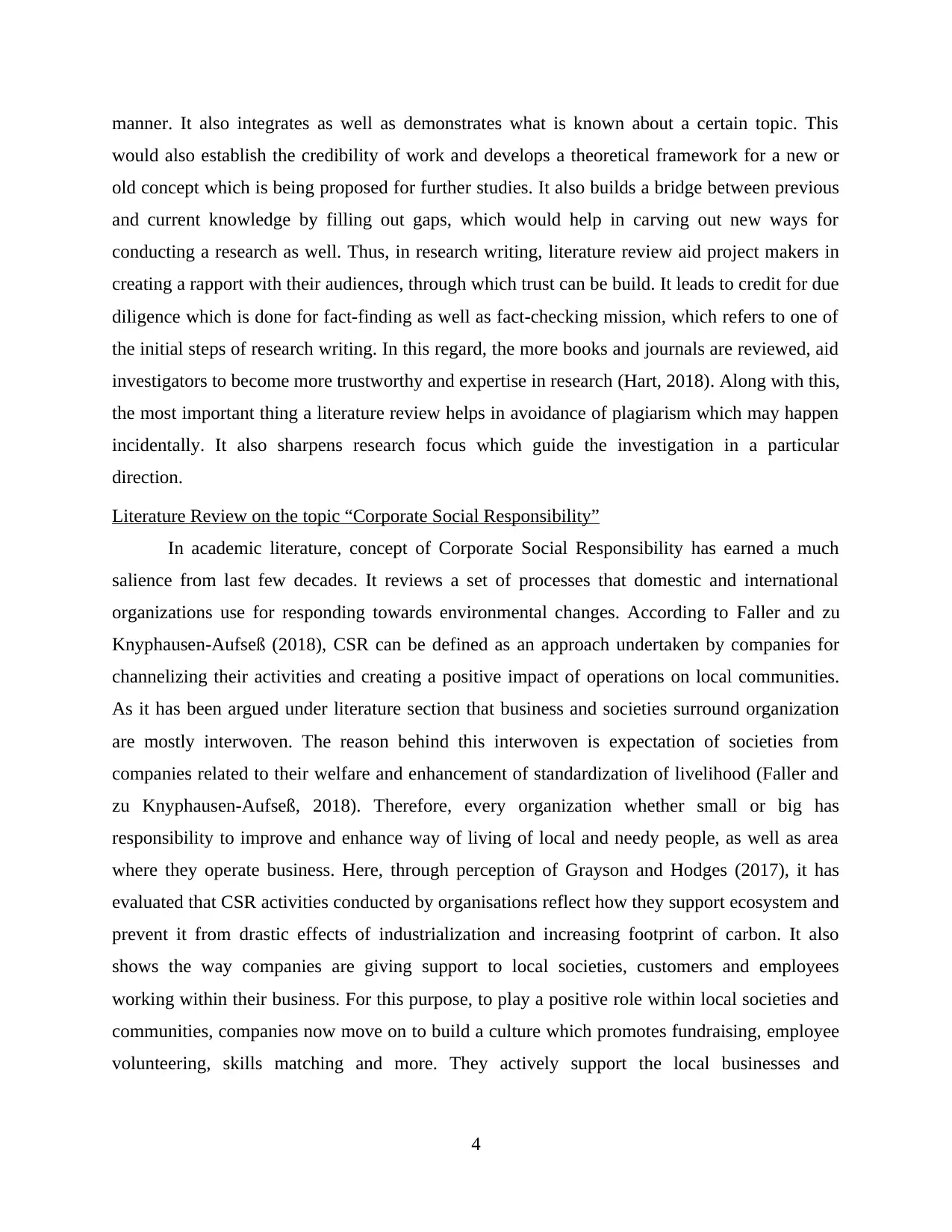
manner. It also integrates as well as demonstrates what is known about a certain topic. This
would also establish the credibility of work and develops a theoretical framework for a new or
old concept which is being proposed for further studies. It also builds a bridge between previous
and current knowledge by filling out gaps, which would help in carving out new ways for
conducting a research as well. Thus, in research writing, literature review aid project makers in
creating a rapport with their audiences, through which trust can be build. It leads to credit for due
diligence which is done for fact-finding as well as fact-checking mission, which refers to one of
the initial steps of research writing. In this regard, the more books and journals are reviewed, aid
investigators to become more trustworthy and expertise in research (Hart, 2018). Along with this,
the most important thing a literature review helps in avoidance of plagiarism which may happen
incidentally. It also sharpens research focus which guide the investigation in a particular
direction.
Literature Review on the topic “Corporate Social Responsibility”
In academic literature, concept of Corporate Social Responsibility has earned a much
salience from last few decades. It reviews a set of processes that domestic and international
organizations use for responding towards environmental changes. According to Faller and zu
Knyphausen-Aufseß (2018), CSR can be defined as an approach undertaken by companies for
channelizing their activities and creating a positive impact of operations on local communities.
As it has been argued under literature section that business and societies surround organization
are mostly interwoven. The reason behind this interwoven is expectation of societies from
companies related to their welfare and enhancement of standardization of livelihood (Faller and
zu Knyphausen-Aufseß, 2018). Therefore, every organization whether small or big has
responsibility to improve and enhance way of living of local and needy people, as well as area
where they operate business. Here, through perception of Grayson and Hodges (2017), it has
evaluated that CSR activities conducted by organisations reflect how they support ecosystem and
prevent it from drastic effects of industrialization and increasing footprint of carbon. It also
shows the way companies are giving support to local societies, customers and employees
working within their business. For this purpose, to play a positive role within local societies and
communities, companies now move on to build a culture which promotes fundraising, employee
volunteering, skills matching and more. They actively support the local businesses and
4
would also establish the credibility of work and develops a theoretical framework for a new or
old concept which is being proposed for further studies. It also builds a bridge between previous
and current knowledge by filling out gaps, which would help in carving out new ways for
conducting a research as well. Thus, in research writing, literature review aid project makers in
creating a rapport with their audiences, through which trust can be build. It leads to credit for due
diligence which is done for fact-finding as well as fact-checking mission, which refers to one of
the initial steps of research writing. In this regard, the more books and journals are reviewed, aid
investigators to become more trustworthy and expertise in research (Hart, 2018). Along with this,
the most important thing a literature review helps in avoidance of plagiarism which may happen
incidentally. It also sharpens research focus which guide the investigation in a particular
direction.
Literature Review on the topic “Corporate Social Responsibility”
In academic literature, concept of Corporate Social Responsibility has earned a much
salience from last few decades. It reviews a set of processes that domestic and international
organizations use for responding towards environmental changes. According to Faller and zu
Knyphausen-Aufseß (2018), CSR can be defined as an approach undertaken by companies for
channelizing their activities and creating a positive impact of operations on local communities.
As it has been argued under literature section that business and societies surround organization
are mostly interwoven. The reason behind this interwoven is expectation of societies from
companies related to their welfare and enhancement of standardization of livelihood (Faller and
zu Knyphausen-Aufseß, 2018). Therefore, every organization whether small or big has
responsibility to improve and enhance way of living of local and needy people, as well as area
where they operate business. Here, through perception of Grayson and Hodges (2017), it has
evaluated that CSR activities conducted by organisations reflect how they support ecosystem and
prevent it from drastic effects of industrialization and increasing footprint of carbon. It also
shows the way companies are giving support to local societies, customers and employees
working within their business. For this purpose, to play a positive role within local societies and
communities, companies now move on to build a culture which promotes fundraising, employee
volunteering, skills matching and more. They actively support the local businesses and
4
Paraphrase This Document
Need a fresh take? Get an instant paraphrase of this document with our AI Paraphraser
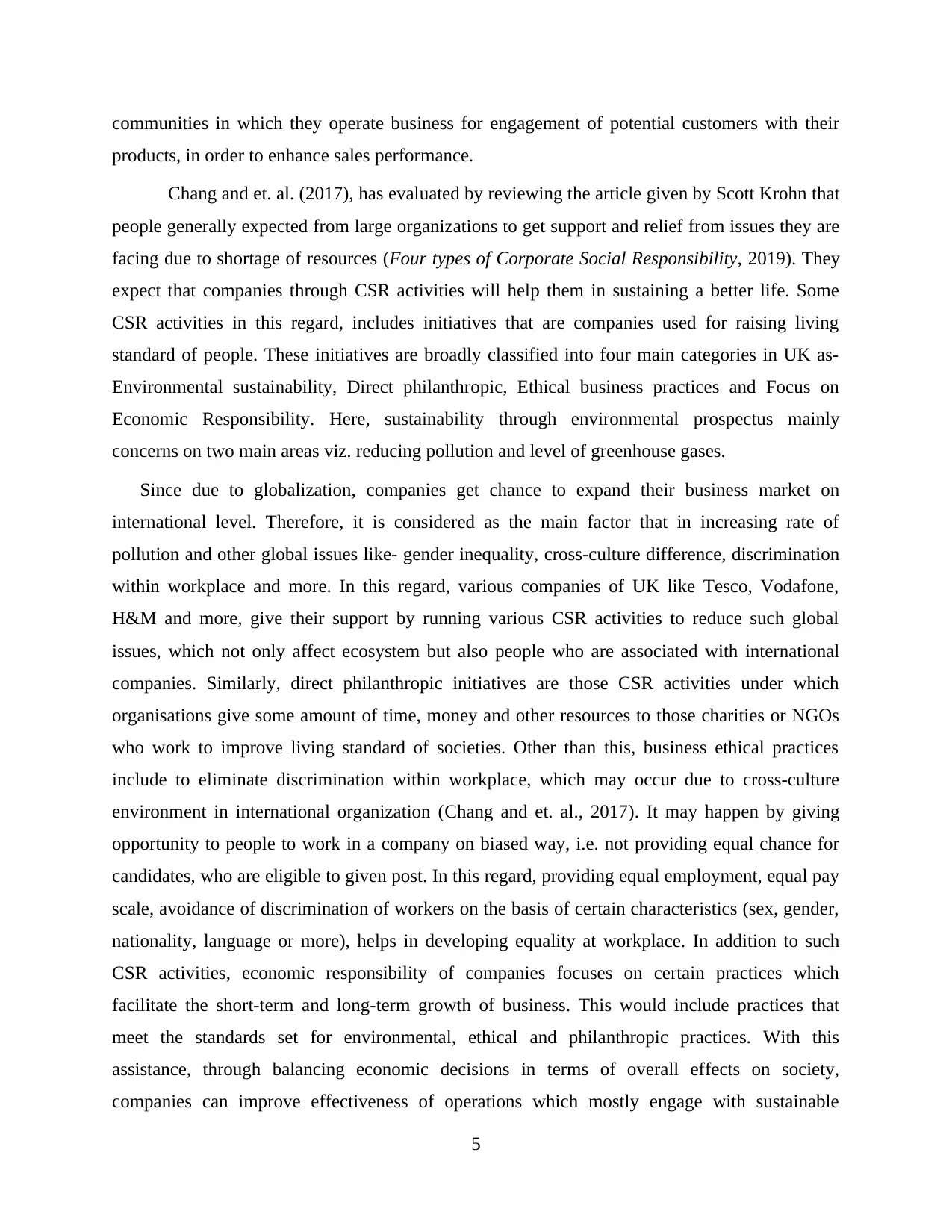
communities in which they operate business for engagement of potential customers with their
products, in order to enhance sales performance.
Chang and et. al. (2017), has evaluated by reviewing the article given by Scott Krohn that
people generally expected from large organizations to get support and relief from issues they are
facing due to shortage of resources (Four types of Corporate Social Responsibility, 2019). They
expect that companies through CSR activities will help them in sustaining a better life. Some
CSR activities in this regard, includes initiatives that are companies used for raising living
standard of people. These initiatives are broadly classified into four main categories in UK as-
Environmental sustainability, Direct philanthropic, Ethical business practices and Focus on
Economic Responsibility. Here, sustainability through environmental prospectus mainly
concerns on two main areas viz. reducing pollution and level of greenhouse gases.
Since due to globalization, companies get chance to expand their business market on
international level. Therefore, it is considered as the main factor that in increasing rate of
pollution and other global issues like- gender inequality, cross-culture difference, discrimination
within workplace and more. In this regard, various companies of UK like Tesco, Vodafone,
H&M and more, give their support by running various CSR activities to reduce such global
issues, which not only affect ecosystem but also people who are associated with international
companies. Similarly, direct philanthropic initiatives are those CSR activities under which
organisations give some amount of time, money and other resources to those charities or NGOs
who work to improve living standard of societies. Other than this, business ethical practices
include to eliminate discrimination within workplace, which may occur due to cross-culture
environment in international organization (Chang and et. al., 2017). It may happen by giving
opportunity to people to work in a company on biased way, i.e. not providing equal chance for
candidates, who are eligible to given post. In this regard, providing equal employment, equal pay
scale, avoidance of discrimination of workers on the basis of certain characteristics (sex, gender,
nationality, language or more), helps in developing equality at workplace. In addition to such
CSR activities, economic responsibility of companies focuses on certain practices which
facilitate the short-term and long-term growth of business. This would include practices that
meet the standards set for environmental, ethical and philanthropic practices. With this
assistance, through balancing economic decisions in terms of overall effects on society,
companies can improve effectiveness of operations which mostly engage with sustainable
5
products, in order to enhance sales performance.
Chang and et. al. (2017), has evaluated by reviewing the article given by Scott Krohn that
people generally expected from large organizations to get support and relief from issues they are
facing due to shortage of resources (Four types of Corporate Social Responsibility, 2019). They
expect that companies through CSR activities will help them in sustaining a better life. Some
CSR activities in this regard, includes initiatives that are companies used for raising living
standard of people. These initiatives are broadly classified into four main categories in UK as-
Environmental sustainability, Direct philanthropic, Ethical business practices and Focus on
Economic Responsibility. Here, sustainability through environmental prospectus mainly
concerns on two main areas viz. reducing pollution and level of greenhouse gases.
Since due to globalization, companies get chance to expand their business market on
international level. Therefore, it is considered as the main factor that in increasing rate of
pollution and other global issues like- gender inequality, cross-culture difference, discrimination
within workplace and more. In this regard, various companies of UK like Tesco, Vodafone,
H&M and more, give their support by running various CSR activities to reduce such global
issues, which not only affect ecosystem but also people who are associated with international
companies. Similarly, direct philanthropic initiatives are those CSR activities under which
organisations give some amount of time, money and other resources to those charities or NGOs
who work to improve living standard of societies. Other than this, business ethical practices
include to eliminate discrimination within workplace, which may occur due to cross-culture
environment in international organization (Chang and et. al., 2017). It may happen by giving
opportunity to people to work in a company on biased way, i.e. not providing equal chance for
candidates, who are eligible to given post. In this regard, providing equal employment, equal pay
scale, avoidance of discrimination of workers on the basis of certain characteristics (sex, gender,
nationality, language or more), helps in developing equality at workplace. In addition to such
CSR activities, economic responsibility of companies focuses on certain practices which
facilitate the short-term and long-term growth of business. This would include practices that
meet the standards set for environmental, ethical and philanthropic practices. With this
assistance, through balancing economic decisions in terms of overall effects on society,
companies can improve effectiveness of operations which mostly engage with sustainable
5
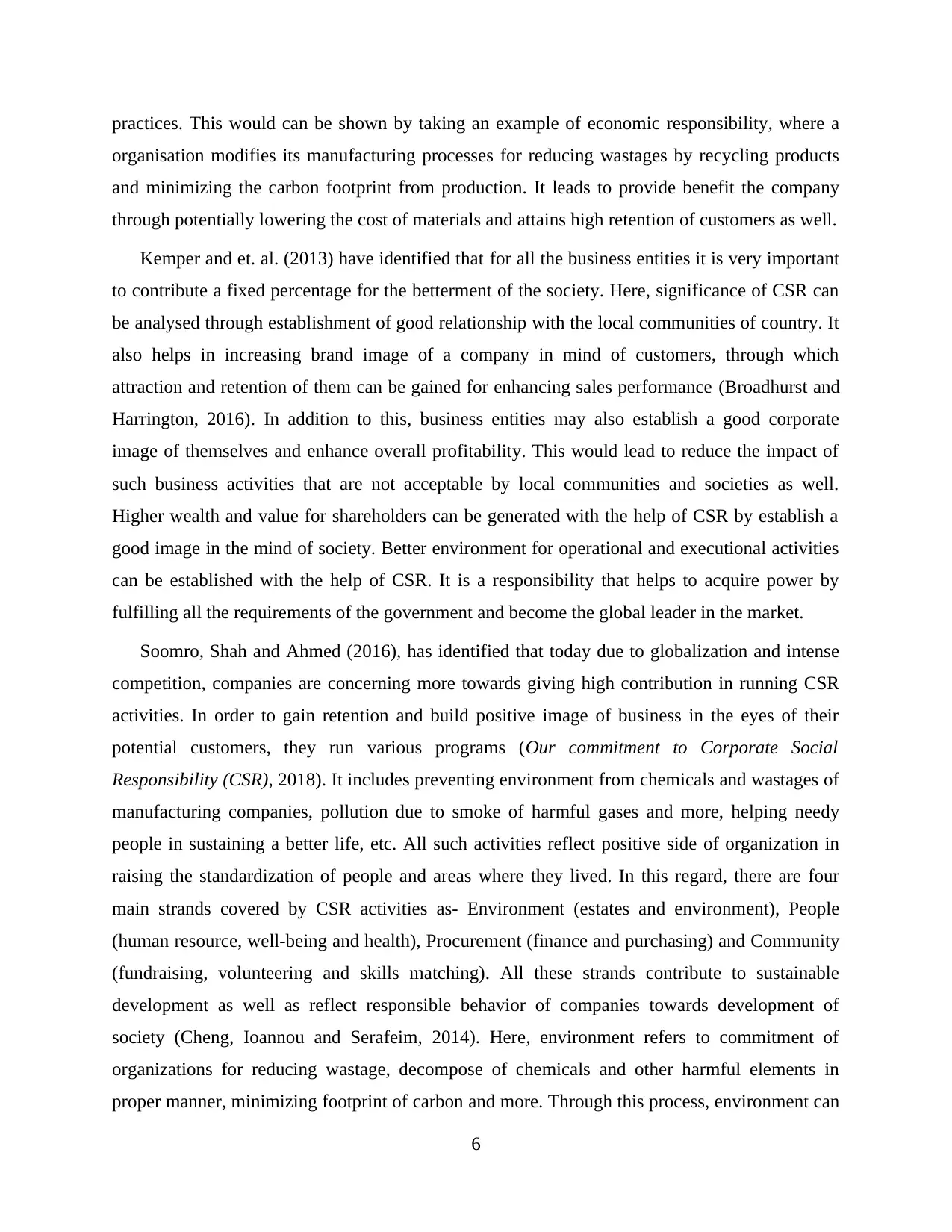
practices. This would can be shown by taking an example of economic responsibility, where a
organisation modifies its manufacturing processes for reducing wastages by recycling products
and minimizing the carbon footprint from production. It leads to provide benefit the company
through potentially lowering the cost of materials and attains high retention of customers as well.
Kemper and et. al. (2013) have identified that for all the business entities it is very important
to contribute a fixed percentage for the betterment of the society. Here, significance of CSR can
be analysed through establishment of good relationship with the local communities of country. It
also helps in increasing brand image of a company in mind of customers, through which
attraction and retention of them can be gained for enhancing sales performance (Broadhurst and
Harrington, 2016). In addition to this, business entities may also establish a good corporate
image of themselves and enhance overall profitability. This would lead to reduce the impact of
such business activities that are not acceptable by local communities and societies as well.
Higher wealth and value for shareholders can be generated with the help of CSR by establish a
good image in the mind of society. Better environment for operational and executional activities
can be established with the help of CSR. It is a responsibility that helps to acquire power by
fulfilling all the requirements of the government and become the global leader in the market.
Soomro, Shah and Ahmed (2016), has identified that today due to globalization and intense
competition, companies are concerning more towards giving high contribution in running CSR
activities. In order to gain retention and build positive image of business in the eyes of their
potential customers, they run various programs (Our commitment to Corporate Social
Responsibility (CSR), 2018). It includes preventing environment from chemicals and wastages of
manufacturing companies, pollution due to smoke of harmful gases and more, helping needy
people in sustaining a better life, etc. All such activities reflect positive side of organization in
raising the standardization of people and areas where they lived. In this regard, there are four
main strands covered by CSR activities as- Environment (estates and environment), People
(human resource, well-being and health), Procurement (finance and purchasing) and Community
(fundraising, volunteering and skills matching). All these strands contribute to sustainable
development as well as reflect responsible behavior of companies towards development of
society (Cheng, Ioannou and Serafeim, 2014). Here, environment refers to commitment of
organizations for reducing wastage, decompose of chemicals and other harmful elements in
proper manner, minimizing footprint of carbon and more. Through this process, environment can
6
organisation modifies its manufacturing processes for reducing wastages by recycling products
and minimizing the carbon footprint from production. It leads to provide benefit the company
through potentially lowering the cost of materials and attains high retention of customers as well.
Kemper and et. al. (2013) have identified that for all the business entities it is very important
to contribute a fixed percentage for the betterment of the society. Here, significance of CSR can
be analysed through establishment of good relationship with the local communities of country. It
also helps in increasing brand image of a company in mind of customers, through which
attraction and retention of them can be gained for enhancing sales performance (Broadhurst and
Harrington, 2016). In addition to this, business entities may also establish a good corporate
image of themselves and enhance overall profitability. This would lead to reduce the impact of
such business activities that are not acceptable by local communities and societies as well.
Higher wealth and value for shareholders can be generated with the help of CSR by establish a
good image in the mind of society. Better environment for operational and executional activities
can be established with the help of CSR. It is a responsibility that helps to acquire power by
fulfilling all the requirements of the government and become the global leader in the market.
Soomro, Shah and Ahmed (2016), has identified that today due to globalization and intense
competition, companies are concerning more towards giving high contribution in running CSR
activities. In order to gain retention and build positive image of business in the eyes of their
potential customers, they run various programs (Our commitment to Corporate Social
Responsibility (CSR), 2018). It includes preventing environment from chemicals and wastages of
manufacturing companies, pollution due to smoke of harmful gases and more, helping needy
people in sustaining a better life, etc. All such activities reflect positive side of organization in
raising the standardization of people and areas where they lived. In this regard, there are four
main strands covered by CSR activities as- Environment (estates and environment), People
(human resource, well-being and health), Procurement (finance and purchasing) and Community
(fundraising, volunteering and skills matching). All these strands contribute to sustainable
development as well as reflect responsible behavior of companies towards development of
society (Cheng, Ioannou and Serafeim, 2014). Here, environment refers to commitment of
organizations for reducing wastage, decompose of chemicals and other harmful elements in
proper manner, minimizing footprint of carbon and more. Through this process, environment can
6
⊘ This is a preview!⊘
Do you want full access?
Subscribe today to unlock all pages.

Trusted by 1+ million students worldwide
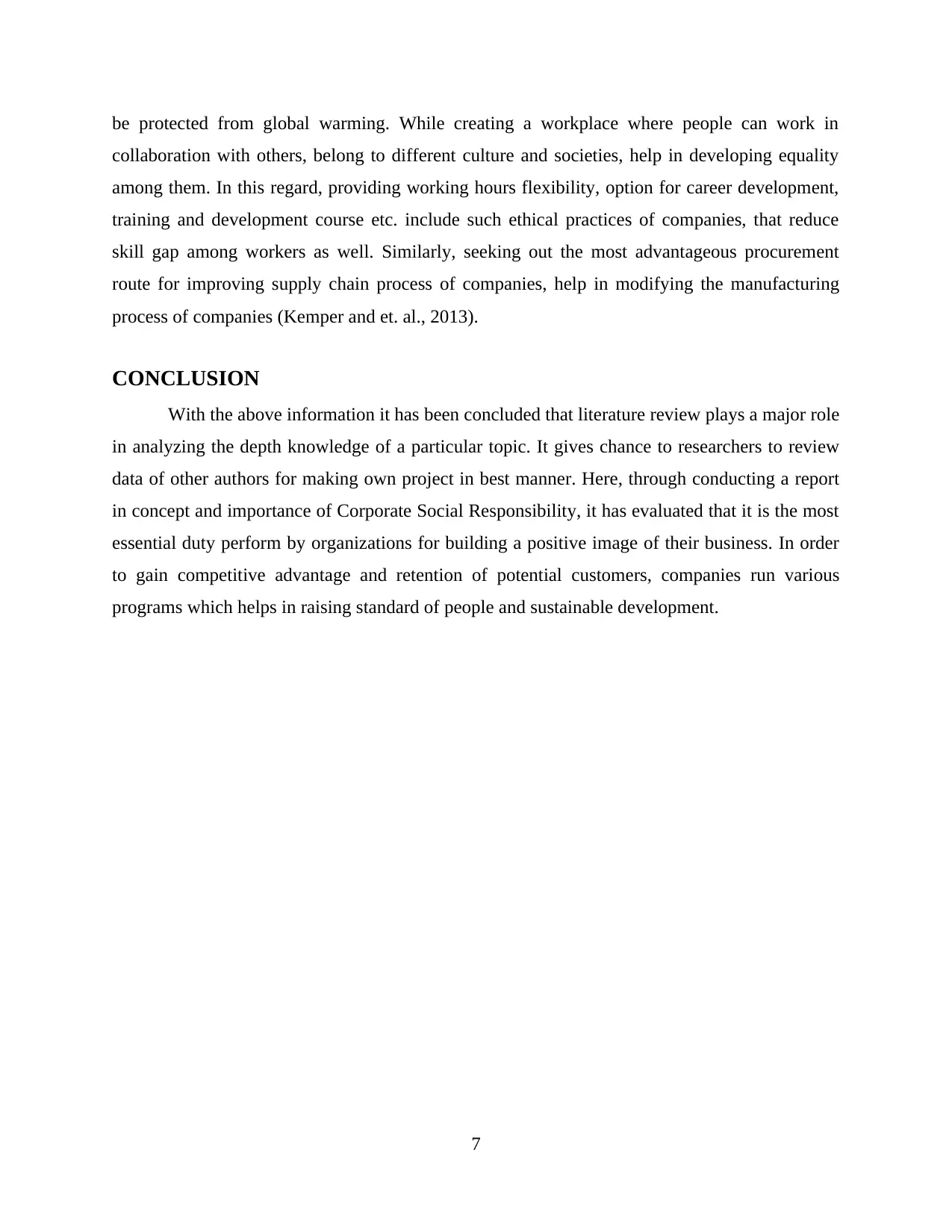
be protected from global warming. While creating a workplace where people can work in
collaboration with others, belong to different culture and societies, help in developing equality
among them. In this regard, providing working hours flexibility, option for career development,
training and development course etc. include such ethical practices of companies, that reduce
skill gap among workers as well. Similarly, seeking out the most advantageous procurement
route for improving supply chain process of companies, help in modifying the manufacturing
process of companies (Kemper and et. al., 2013).
CONCLUSION
With the above information it has been concluded that literature review plays a major role
in analyzing the depth knowledge of a particular topic. It gives chance to researchers to review
data of other authors for making own project in best manner. Here, through conducting a report
in concept and importance of Corporate Social Responsibility, it has evaluated that it is the most
essential duty perform by organizations for building a positive image of their business. In order
to gain competitive advantage and retention of potential customers, companies run various
programs which helps in raising standard of people and sustainable development.
7
collaboration with others, belong to different culture and societies, help in developing equality
among them. In this regard, providing working hours flexibility, option for career development,
training and development course etc. include such ethical practices of companies, that reduce
skill gap among workers as well. Similarly, seeking out the most advantageous procurement
route for improving supply chain process of companies, help in modifying the manufacturing
process of companies (Kemper and et. al., 2013).
CONCLUSION
With the above information it has been concluded that literature review plays a major role
in analyzing the depth knowledge of a particular topic. It gives chance to researchers to review
data of other authors for making own project in best manner. Here, through conducting a report
in concept and importance of Corporate Social Responsibility, it has evaluated that it is the most
essential duty perform by organizations for building a positive image of their business. In order
to gain competitive advantage and retention of potential customers, companies run various
programs which helps in raising standard of people and sustainable development.
7
Paraphrase This Document
Need a fresh take? Get an instant paraphrase of this document with our AI Paraphraser
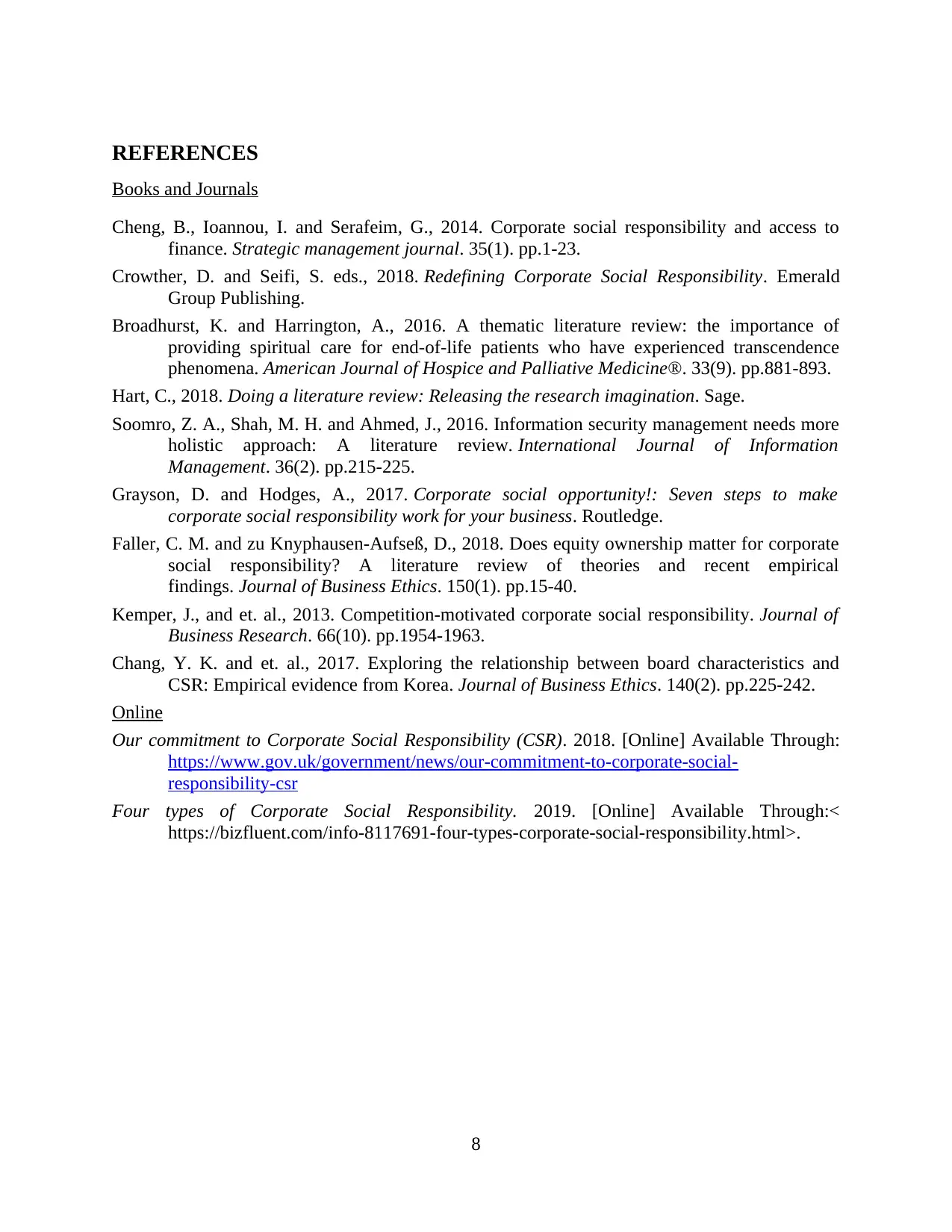
REFERENCES
Books and Journals
Cheng, B., Ioannou, I. and Serafeim, G., 2014. Corporate social responsibility and access to
finance. Strategic management journal. 35(1). pp.1-23.
Crowther, D. and Seifi, S. eds., 2018. Redefining Corporate Social Responsibility. Emerald
Group Publishing.
Broadhurst, K. and Harrington, A., 2016. A thematic literature review: the importance of
providing spiritual care for end-of-life patients who have experienced transcendence
phenomena. American Journal of Hospice and Palliative Medicine®. 33(9). pp.881-893.
Hart, C., 2018. Doing a literature review: Releasing the research imagination. Sage.
Soomro, Z. A., Shah, M. H. and Ahmed, J., 2016. Information security management needs more
holistic approach: A literature review. International Journal of Information
Management. 36(2). pp.215-225.
Grayson, D. and Hodges, A., 2017. Corporate social opportunity!: Seven steps to make
corporate social responsibility work for your business. Routledge.
Faller, C. M. and zu Knyphausen-Aufseß, D., 2018. Does equity ownership matter for corporate
social responsibility? A literature review of theories and recent empirical
findings. Journal of Business Ethics. 150(1). pp.15-40.
Kemper, J., and et. al., 2013. Competition-motivated corporate social responsibility. Journal of
Business Research. 66(10). pp.1954-1963.
Chang, Y. K. and et. al., 2017. Exploring the relationship between board characteristics and
CSR: Empirical evidence from Korea. Journal of Business Ethics. 140(2). pp.225-242.
Online
Our commitment to Corporate Social Responsibility (CSR). 2018. [Online] Available Through:
https://www.gov.uk/government/news/our-commitment-to-corporate-social-
responsibility-csr
Four types of Corporate Social Responsibility. 2019. [Online] Available Through:<
https://bizfluent.com/info-8117691-four-types-corporate-social-responsibility.html>.
8
Books and Journals
Cheng, B., Ioannou, I. and Serafeim, G., 2014. Corporate social responsibility and access to
finance. Strategic management journal. 35(1). pp.1-23.
Crowther, D. and Seifi, S. eds., 2018. Redefining Corporate Social Responsibility. Emerald
Group Publishing.
Broadhurst, K. and Harrington, A., 2016. A thematic literature review: the importance of
providing spiritual care for end-of-life patients who have experienced transcendence
phenomena. American Journal of Hospice and Palliative Medicine®. 33(9). pp.881-893.
Hart, C., 2018. Doing a literature review: Releasing the research imagination. Sage.
Soomro, Z. A., Shah, M. H. and Ahmed, J., 2016. Information security management needs more
holistic approach: A literature review. International Journal of Information
Management. 36(2). pp.215-225.
Grayson, D. and Hodges, A., 2017. Corporate social opportunity!: Seven steps to make
corporate social responsibility work for your business. Routledge.
Faller, C. M. and zu Knyphausen-Aufseß, D., 2018. Does equity ownership matter for corporate
social responsibility? A literature review of theories and recent empirical
findings. Journal of Business Ethics. 150(1). pp.15-40.
Kemper, J., and et. al., 2013. Competition-motivated corporate social responsibility. Journal of
Business Research. 66(10). pp.1954-1963.
Chang, Y. K. and et. al., 2017. Exploring the relationship between board characteristics and
CSR: Empirical evidence from Korea. Journal of Business Ethics. 140(2). pp.225-242.
Online
Our commitment to Corporate Social Responsibility (CSR). 2018. [Online] Available Through:
https://www.gov.uk/government/news/our-commitment-to-corporate-social-
responsibility-csr
Four types of Corporate Social Responsibility. 2019. [Online] Available Through:<
https://bizfluent.com/info-8117691-four-types-corporate-social-responsibility.html>.
8
1 out of 8
Related Documents
Your All-in-One AI-Powered Toolkit for Academic Success.
+13062052269
info@desklib.com
Available 24*7 on WhatsApp / Email
![[object Object]](/_next/static/media/star-bottom.7253800d.svg)
Unlock your academic potential
Copyright © 2020–2025 A2Z Services. All Rights Reserved. Developed and managed by ZUCOL.



